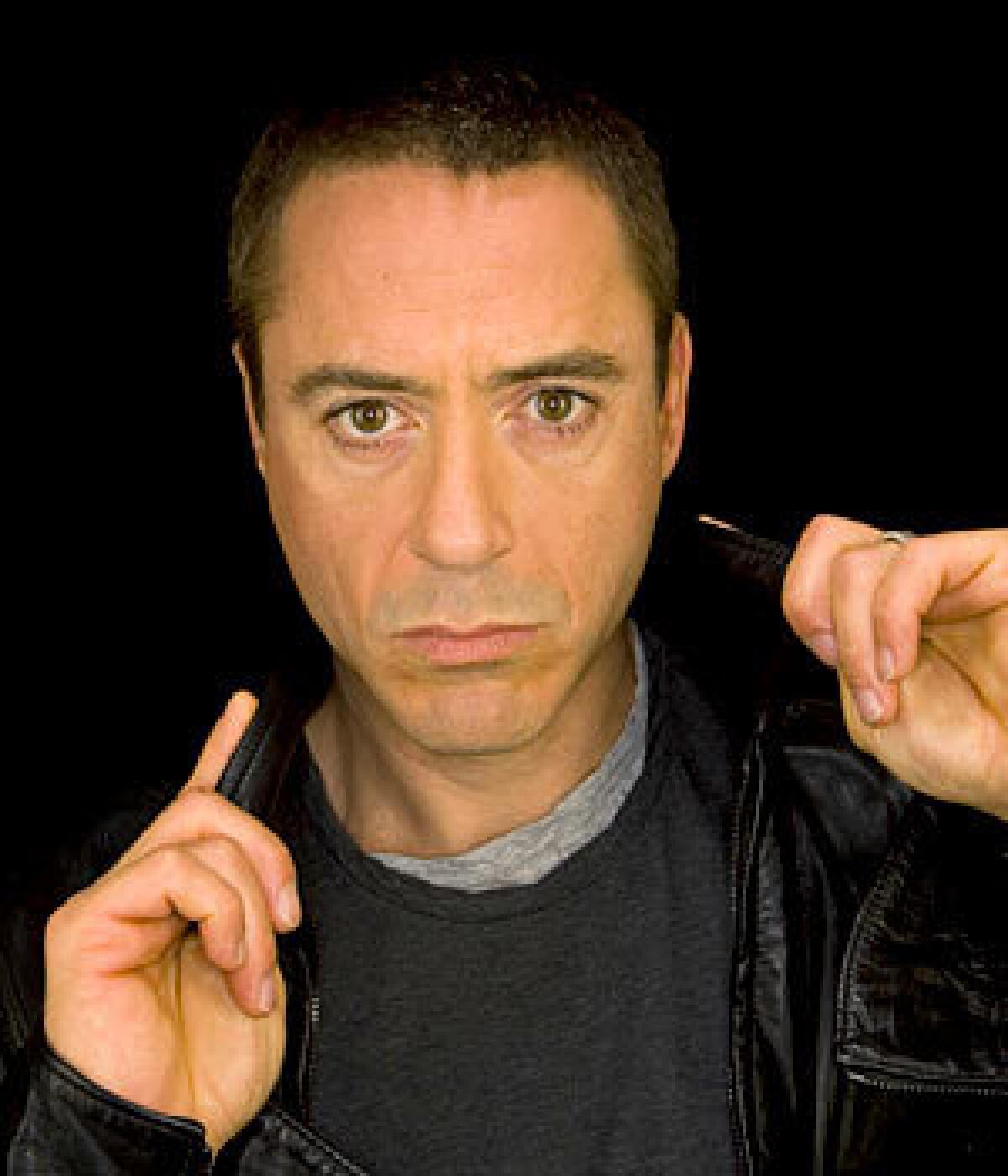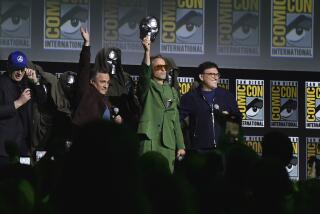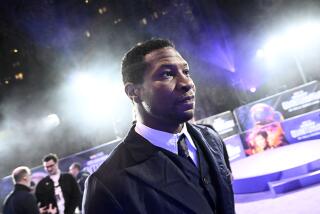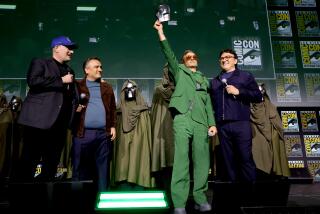Robert Downey Jr. is ready to play the hero in ‘Iron Man’

TO become a mega-movie star these days, a man must don the tights. With a few notable exceptions like Leonardo DiCaprio, who had the good fortune to be in the highest-grossing movie of all time (that would be “Titanic”), almost every $20-million man has done his time as a caped crusader, masked marvel or some popcorn equivalent, such as a pirate or extraterrestrial G-man. Call it the Nicolas Cage career plan, in which Cage traded in artistic cred for more muscles, Bruckheimer-bravado and enormous paychecks. In his canny wake have followed Johnny Depp, Tobey Maguire, Keanu Reeves, Will Smith -- the list of stars who’ve streamlined their individuality for mega-stardom goes on and on.
Now it’s Robert Downey Jr.’s turn.
Huh?
Yup, the 43-year-old ex-junkie, ex-con, Oscar-nominated professional entertainer is renouncing his title as the talent most likely to disappoint, everyone’s lovable screw-up, the walking cautionary-tale. He’s assuming the mantle of “Iron Man,” another in a long line of comic book renditions, which hits theaters Friday, kicking off the summer movie season.
Given Downey’s years as a reigning wit, an unflappable, unpredictable screen presence, the thought of him soaring the skies in a red metal suit and bopping bad guys is a little depressing to someone over 25, except for the fact that Downey seems so darn happy about it. Really, really happy. Relieved. Maybe even grateful.
He’s about to barnstorm the world on a month-long “Iron Man” tour, and he’s genuinely thrilled. Finally, he’s the headliner -- the one with his mug on dolls and Slurpee cups. “It’s feeling the support of the machine of the industry and all that behind you. You know, supporting what you busted your ass doing,” he explains.
Despite having worked in Hollywood since he was a teenager, Downey has never been part of the blockbuster machine, the kind of star who makes studio execs see dollar signs. “I’m just on people’s radar in a different way,” he says. “If you’re not on someone’s radar, you don’t notice because there’s no, like, business pheromone coming off of them.”
REDEMPTION
LIFE is finally good.
He’s not dead. He’s not on drugs. As recently as five years ago, Downey had to pay for his own insurance to even appear in a movie, and now a studio is banking a huge franchise on him, and the buzz-o-meter is off the charts. As Tony Stark, debonair super-nerd weapons tycoon turned superhero, he’s playing a character who is essentially a PG-riff on his persona -- he’s decadent-lite, a self-indulgent high-flier who wakes up at age 40 and decides to do good. In the film, Stark is captured by guerrillas in Afghanistan, realizes how the arms he’s been pushing for the last decades are creating more harm than good and develops a techno-suit that allows him to fly, shoot fire and escape his jail cave. It’s an origin story, refashioned as a coming-of-middle-age saga -- Stark sets out to atone for his life of sin -- but will he be redeemed?
Hmmm. Art imitating life anyone?
Almost every movie star with a brain is professionally charming in an interview, but Downey’s charm goes far beyond that. It appears wired into his DNA, an endearing need to be liked that coexists with a fierce desire not to care what anybody thinks. Antic deadpan is one of his modes. Teflon vulnerability is another. You have to spend only five minutes with the guy to understand why Hollywood stuck by him through his travails -- it’s a testament to his talent and innate likability.
When the cast of professional image-managers finally leave the hotel suite, Downey sprawls out in a chair with balletic grace and downshifts into a thoughtful-philosophical-jazz monologuist mode. He’s ready to professionally opine on himself as required by his role as atoning movie star. He smokes a cigar, perhaps his only remaining vice, and his innate restlessness is confined to fidgety opening and shutting a small silver suitcase that contains a cornucopia of vitamin supplements for his upcoming multi-continent publicity tour. “That’s a pituitary formula. That’s for jet lag,” he says, pointing to various bottles. “Anyone who doesn’t need their yin tonified is beyond me,” he deadpans.
CLIMBING BACK
Downey has been working up a storm -- by many accounts he steals the show in the late summer comedy “Tropic Thunder” with his performance as an Oscar-winning Australian actor named Kirk Lazarus who goes for the ultimate transformation by having his skin darkened in a Singapore clinic so he can convincingly play an African American screen commando in a Vietnam epic. “He stays in character all the time even when he’s not filming,” explains director/costar Ben Stiller. Still, as Stiller notes, “the voice and his look is so far from who he is, when [Robert] would drop character, it would be disconcerting. He’s been underutilized in the comedy world.”
Downey also has his would be-Oscar contender later this year. Just last week, he finished his part as Los Angeles Times columnist Steve Lopez in “The Soloist,” a film about Lopez’s relationship with a musically gifted homeless schizophrenic, played by Jamie Foxx. Downey says his wife, producer Susan Levin Downey, told him, “You look like a billy goat with your gray beard and the hair. She goes, ‘Put a nice rinse in your hair for the press tour and shave, and don’t come home until you’ve cleaned up things,’ ” recounts Downey.
Downey’s sober re-ascension of Hollywood is a far cry from the guy who was once arrested while driving his Porsche down Sunset Boulevard naked, chucking phantom rats out the window. Or the man-boy who played Goldilocks by wandering into a neighbor’s house and falling asleep in a child’s bed only to be awakened by paramedics. The years 1996 to 2000 flashed by in a blur of drug arrests and failed drug tests, and was capped by a year’s stint in the California state prison in Corcoran after he violated probation. He reemerged in television’s “Ally McBeal,” won a Golden Globe and was fired after he tumbled off the wagon and was arrested for cocaine and methamphetamine possession.
After a year in rehab, he began rebuilding his career again, eventually nabbing more interesting movies such as “Kiss Kiss Bang Bang,” “Good Night, and Good Luck,” “Zodiac” and “Fur: An Imaginary Portrait of Diane Arbus.” Still, no one was thinking of him to top-line a would-be commercial juggernaut, and “Iron Man” didn’t exactly drop in his lap.
“Much to my surprise, I really didn’t fit any of the criteria for the kind of actor they thought they should cast,” says Downey.
The film is the first to be fully financed by Marvel, the comic book giant. Unlike Spider-Man, who’s earnest, or Batman, who’s moody, Iron Man is a geek turned chic -- Bill Gates crossed with George Clooney, a hero for the Google age. It would be better if the actor who played him was actually smart, rather than pretending to be smart. And for the Marvel team, there was one more potential hurdle -- Iron Man never starred in his own TV series, and so doesn’t have the mainstream awareness factor of his more famous superhero brethren. It mattered -- a lot -- who donned Iron Man’s shiny red turbo-suit.
As it turned out, Downey brought along his own bag of amusing tricks -- upgrading the character’s flip awareness -- adding subtext and sizzle when there wasn’t any.
Producer Kevin Feige, who’s also president of production for Marvel, remembers being distinctly underwhelmed by the first list of potential Iron Mans sent over by the casting director. “Nothing popped for us,” he says. Director Jon Favreau, who’d popularized retro-cool in “Swingers,” made a mainstream hit with “Elf” and had been brought on to give the film some hipster panache, was fiddling with something on the bookshelf when a name suddenly dropped from his lips: “Robert Downey Jr.”
“We both went, ‘That’s interesting,’ ” says Feige. They quickly dismissed the idea, but still it lingered.
As it turned out, Downey wanted the part but wasn’t exactly sanguine about his chances. After he met with the Marvel team, its then chieftain Avi Arad walked him to his car and told him, “You’re a real craftsman.” It felt like one of those very kind brushoffs -- Downey suspected his casting in “Iron Man” was unlikely.
But he didn’t give up. “Nowadays, I really, really trust synchronicity,” says Downey. “It’s not just one way. There’s a whole realm of possibilities. Everything is so connected that it’s not one single event that determines anything. I refused to not champion myself for this. I said to Jon [Favreau], ‘If you don’t mind, I’m just going to keep imagining this is possible.’ ”
“There were people in our company who directly said, ‘No. You can’t [cast Downey]. Next,” says Feige. They started looking at alternatives, but Favreau and Feige also set about making the case for Downey. They called the insurance companies, which had no problems with Downey anymore because he’d been clean for five years. They called colleagues who vouched for him. The filmmakers pointed out that even the family-friendly giant Walt Disney had no problem putting Downey in “The Shaggy Dog.”
The room warmed to Downey -- but still the actor would have to screen test for the part, the first time since his Oscar-nominated performance in “Chaplin.”
FULLY PREPARED
GIVEN his spark-flying mind, it’s easy to assume that Downey ad-libs what he does on screen, quipping, prancing, dancing with effortless humor. Ironically enough, however, when auditioning for “Iron Man,” he prepared for the test of his life.
Not that he likes giving away his trade secrets. “I’m a little far out with my methods, but it works for me,” he says, explaining he believes in energy, and “the feng shui of it all.” Still all the mysticism appears grounded in basic hard work, memorizing lines so thoroughly that “literally if you woke me in the middle of the night I could tell them as quickly as I could tell you my driver’s license. Then I write it out illegibly so as I think I’m knowing it, if I can read it in this kind of gobbledygook then I actually know it. Then I write it out in an acronym so that the first letter of every word is just a cue. And then I literally read that as fast as I can read it because I’m training my subconscious now to respond to it.”
Then he checks himself, and annotates the script with notes about the action’s subtext or alternate lines, which he hopes are funnier or more poignant. “You’ve got your wheels under you and you can start moving upstairs a bit,” he says.
“His mind works so fast, and his thought process continues in such a unique way. He’s able to make these brilliant connections -- metaphors spring out and he’s able to stay right on scene,” says Feige, who got to see Downey Downey-ize the character. “A lot of it was in the script, and it sounds like he’s riffing. A lot of it was riffed. Most of it was ‘branched out’ ” from what was written. The script had two bland robot helpers for Stark, which Downey transformed into twee British adjuncts in the John Gielgud mode.
It’s dizzying to hear the meticulousness of Downey’s routine, but somehow the very laboriousness is what Downey seems to crave. Routine, rules, a pattern. As he talks, he drops shards of what seems to anchor him -- his wife, his helpers, wing chun kung fu, a psychological commitment to the present, to not over-mythologizing what goes on in his life. That purposeful centeredness applies even to what he calls his “Red Sox experience,” of landing the role in “Iron Man” after years of wandering in the psychological and professional desert.
“The problem was I could have gotten so stoked that I ran out of steam and wound up being sick for the two first weeks.” Now he’s learned to manage the crazy expectations of his own psyche.
“I just kind of honestly feel that this is just kind of like me making good on the promise of my late teens in a way,” he says, and he’s going to savor every second of the delayed blossoming, not just the work, but the hoopla, the autographs, the machine of fame that once threatened to pulverize his soul. “Every day between now and the end of the month for me is like a kind of closure on this incredibly ridiculously tough and wonderful and awesome and ghastly experience of coming to L.A. 25 years ago.”
More to Read
The biggest entertainment stories
Get our big stories about Hollywood, film, television, music, arts, culture and more right in your inbox as soon as they publish.
You may occasionally receive promotional content from the Los Angeles Times.










